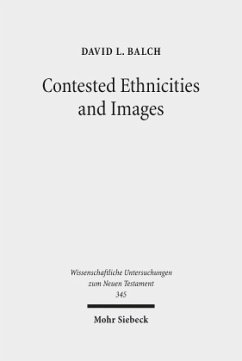Ethnic values changed as Imperial Rome expanded, challenging ethnocentric values in Rome itself, as well as in Greece and Judea. Rhetorically, Roman, Greek, and Judean writers who eulogized their cities all claimed they would receive foreigners. Further, Greco-Roman narratives of urban tensions between rich and poor, proud and humble, promoted reconciliation and fellowship between social classes. Luke wrote Acts in this ethnic, economic, political context, narrating Jesus as a founder who changed laws to encourage receiving foreigners, which promoted civic, missionary growth and legitimated interests of the poor and humble. David L. Balch relates Roman art to early Christianity and introduces famous, pre-Roman Corinthian artists. He shows women visually represented as priests, compares Dionysian and Corinthian charismatic speech and argues that larger assemblies of the earliest, Pauline believers "sat" (1 Cor 14.30) in taverns. Also, the author demonstrates that the image of a pregnant woman in Revelation 12 subverts imperial claims to the divine origin of the emperor, before finally suggesting that visual representations by Roman domestic artists of "a category of women who upset expected forms of conduct" (Bergmann) encouraged early Christian women like Thecla, Perpetua and Felicitas to move beyond gender stereotypes of being victims. Balch concludes with two book reviews, one of Nicolas Wiater's book on the Greek biographer and historian Dionysius, who was a model for both Josephus and Luke-Acts, the second of a book by Frederick Brenk on Hellenistic philosophy and mystery religion in relation to earliest Christianity.



